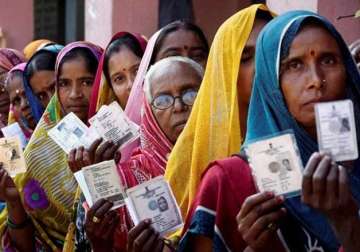The results of the 2015 assembly elections in Bihar surprised many, largely because of the scale of the victory of the Grand Alliance (GA).
Most opinion & exit polls predicted a neck to neck fight with some giving NDA the edge and others rooting for GA. But behind this massive victory of the GA, there are some interesting numbers.
Here is a two part series exploring some of the highlights from these elections.
Vote Share
In terms of the vote share, the BJP got the highest share of 24.4%, while it must be mentioned that BJP also contested in the highest number of seats.
If one takes into account the vote share per seat contested, the RJD leads the pack followed by JD(U) and the Congress; BJP came a distant fourth.
One of the reasons for the NDA's loss is BJP's loss of more than 5% vote share compared to the 2014 Lok Sabha election.
As a group, the NDA lost more than 5% of the vote share compared to the 2014 Lok Sabha election. On the other hand, the GA had lost more than 3% of their collective vote share compared to 2014 Lok Sabha election.
While 3% loss is substantial, it must be noted that the GA contested separately in 2014 and to their credit, they were able to hold onto their vote share despite contesting a lesser number of seats.
JD(U)'s turnaround is quite remarkable so much so that they improved their vote share compared to 2014 despite contesting in less than half the number of seats.
Strike Rate
Strike Rate of a party is defined as the number of seats won to the number of seats contested. In the 2010 Bihar Assembly Election, the BJP had the best strike rate of close to 90%, winning every 9 out of 10 seats it contested.
The BJP even had a better strike rate than the JD(U) in 2010. The RJD and the Congress had dismal strike rates of 13.1% and 1.6% respectively.
In 2015, the situation was quite a contrast. The RJD had the best strike rate of close to 80% of all the parties, followed by JD(U) with 70%. Even Congress had a strike rate of 66%, up from a mere 1.6% in 2010.
On the other hand, BJP's strike rate went down to 34%. The NDA allies (LJP, RLSP & HAM) had a single digit strike rate. The GA's strike rate was 3 times that of the NDA.
Performance in Reserved & General Seats
It was expected that the NDA would do well in the reserved seats with the likes of both LJP & HAM in its fold. Bihar has a total of 38 seats reserved for SCs and 2 for the STs.
The NDA's performance in the reserved seats was actually worse than its performance in the general seats.
Out of the 38 it contested, the NDA could win only 7 SC reserved seats.
The Grand Alliance, on the other hand won in 29 of the 38 seats reserved seats for SCs. Both the ST reserved seats were won by the Grand Alliance. The LJP contested in 9 SC reserved seats and could not win in a single seat.
In fact, the NDA's vote share in reserved seats was less than its vote share in general seats.
For the GA, its share in SC reserved seats was 2% more than its vote share in general seats.
(Rakesh has been working on issues related to Right to Information (RTI) for a decade. He is a Data/Information enthusiast & passionate about Governance/Policy issues.)
